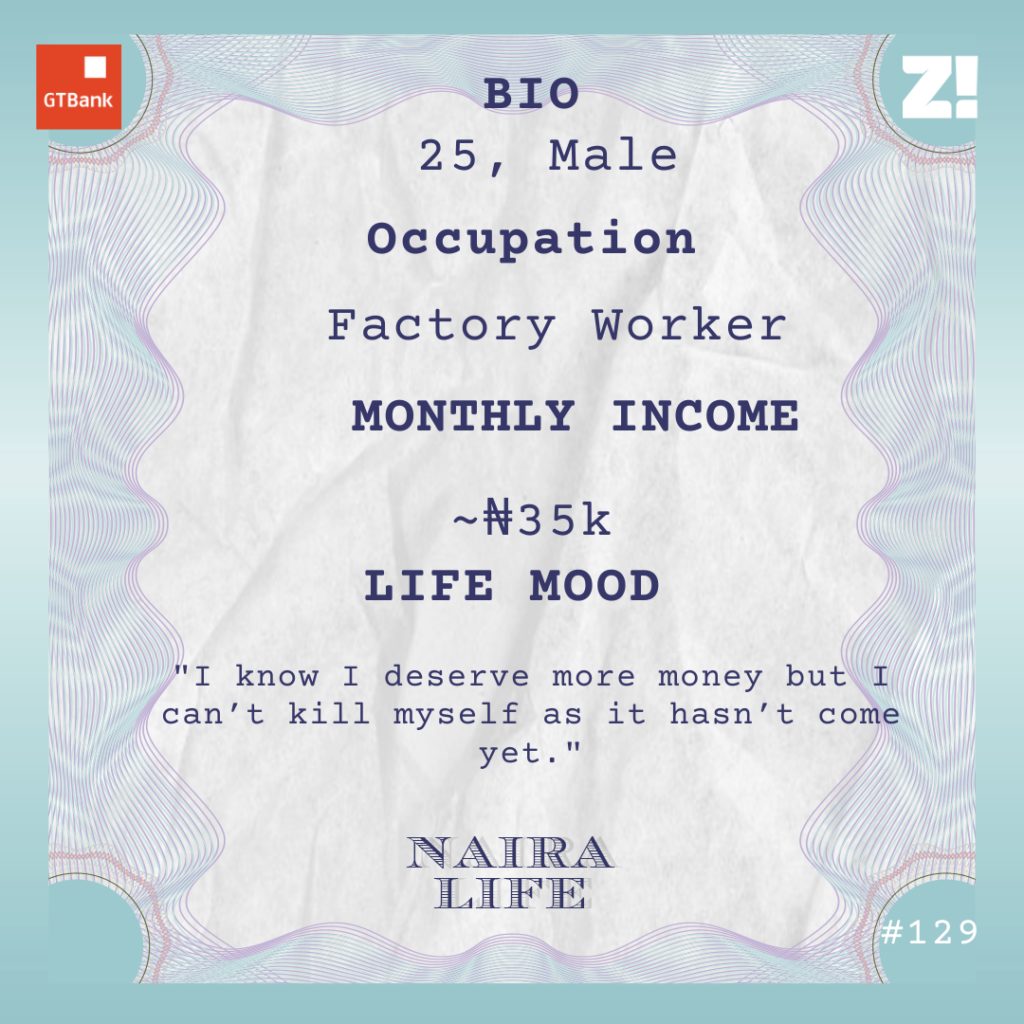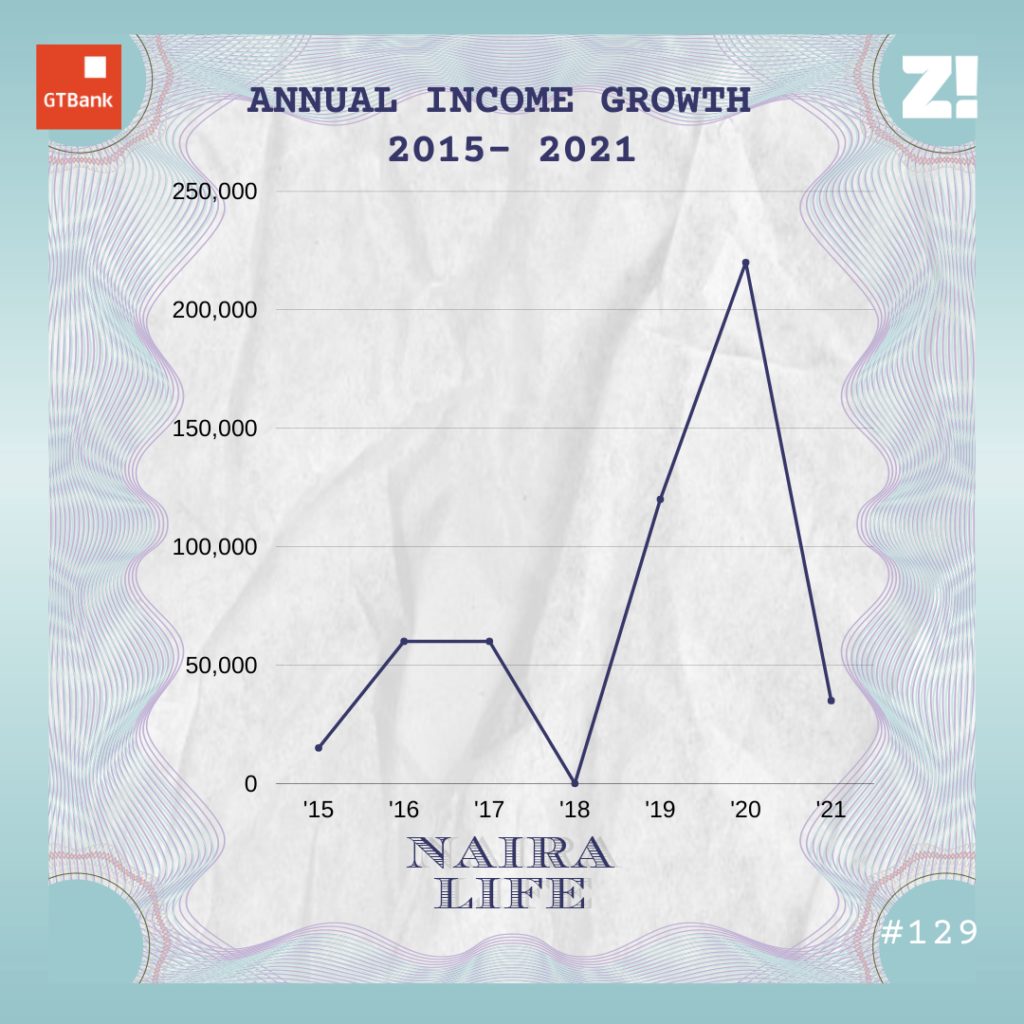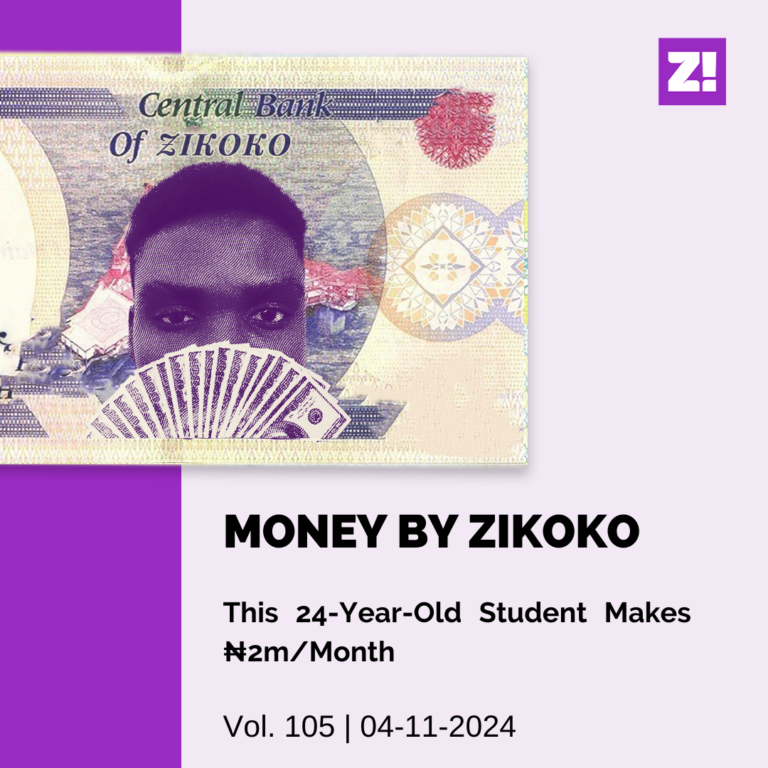Every week, Zikoko seeks to understand how people move the Naira in and out of their lives. Some stories will be struggle-ish, others will be bougie. All the time, it’ll be revealing.

Between 2016 and 2020, the biggest flex for the 25-year-old in this #NairaLife was rising to the top of the ladder at the factory where he worked, and he did it. But he quit the job in 2021. While this has affected his finances, it’s all part of a grand plan.

Do you remember your earliest memory of money?
Yes. In 2001 or 2002, I found a Biafran bank note in my dad’s diary. I was fascinated because it was different from the naira notes I was familiar with. I asked my parents, and they told me about the history of the currency. They also showed me some coins we used pre-independence. It was quite an experience.
I bet. What was it like growing up though?
My parents were on the shorter end of the financial ladder. They were farmers although my dad did some trading on the side. Money was not easy to come by. As I grew, I began to understand what it meant to have money and what you could miss out on when you didn’t. I realised early that my parents couldn’t do everything for me even if they wanted to. I had to hustle on my own and make money. I’ve been on that journey since that time.
When did the hustle start for you?
The moment I got into secondary school in 2008. I grew up in the south south, and most of the people I knew on the streets worked on people’s farms to get money. Farming wasn’t my thing, so I went for a job at a sawmill. I did everything there was to do there — from clearing sawdust from the mills, taking stock of the inventory and sorting out the wood when they arrived. I worked from 3 p.m. to 7 p.m. on weekdays because of school and earned between ₦500 and ₦700. But I worked full time on weekends and a very good day at work fetched me ₦1500.
How long did you work at the sawmill for?
From 2008 to 2015 when I left secondary school. After I graduated from secondary school, I got another job to manage a cold room and the salary was ₦15k. I won’t lie, it was big money for me. For context, one of my friends got a job as a teacher a little earlier than I did and his salary was ₦5k.
However, I knew that I didn’t want to manage a cold room forever. I wanted to go to university. In 2015, I bought a JAMB form and applied to study law at a university in the south south. I scored 297 in the UTME examination and 71 in post-UTME. I thought that was going to be enough. The first admission list was released, and I didn’t find my name on it. The second and third lists were followed, my name wasn’t on those either. The last list was a supplementary list and people said I needed to pay or have connections at the university to make that list. I didn’t have the money or the connection, so I let it go.
My second plan was to move to Lagos to find work. I was talking with a friend, and he told me that his older brother was working in Lagos and earning ₦50k per month, which seemed like a lot of money. So I left home for Lagos.
After a few months in Lagos, I checked the portal again and found out that I had been offered French Education. I didn’t accept it. I should have been in the merit list.
I’m sorry about that. When did you move to Lagos?
February 2016. I knew nobody in Lagos and arrived on a Friday with ₦7k in my pocket. For the first week, I was on the streets looking for a factory to work in. I slept in bus parks at night and freshened up in public bathrooms in the mornings. After three days of looking for work, I did something funny.
What?
My money had run down to ₦3k. I was beginning to get scared and thinking about going back home. So I spent the remaining money on food. Now, I couldn’t go home even if I wanted to.
Wild.
One of my sisters called me the following day and when she found out that I had gone to Lagos without an accommodation arrangement, she was mad at me. But she contacted someone. The person introduced me to one of his friends and told him about what brought me to Lagos. Luckily, the person agreed that I could stay with him. I lived with him for two years, and he helped me find my first job.
Lit. Tell me about the job.
He fixed me with some people who drilled boreholes. They paid me ₦2k for each day I worked with them, but the problem was that the jobs weren’t regular. After working with them for a month, I was anxious about getting a proper job and told the guy who took me in about it. He introduced me to someone in a sachet water factory where I was offered a job as a stacker. This was March 2016.
What does a stacker do?
A stacker moves the bags of water from the production room to the loading point and also loads the bags into the trucks for distribution. Every new person who joins the factory starts as a stacker. The job paid ₦800 per day and I got paid once every two weeks. The working hours weren’t fixed, though. Once we started working at 7 a.m, we could be there until 8 or 9 p.m or later depending on sales that day.
Omo.
Three weeks after I started working at the factory, I came to work earlier than usual one morning and saw some guy I hadn’t met working one of the machines and packing the sachet water into bags at the same time. It wasn’t my job, but I felt the need to help him. I joined him and started packing the water into the bags while he operated the machine. I struggled with it for a while but I got the hang of it. When we finished, he asked me, “Do you want to be a packer?”
Wait, who was he?
It turned out that he was the section head and managed my production unit. A packer is a step above a stacker, and what the packer does is to fit the sachets of water into the bag. 20 sachets of water go into one bag. They earn ₦2 for every bag they pack and the slowest person packs at least 1000 bags daily. That’s more money than I was earning as a stacker.
I guess you said yes to the job.
I did. I told him I’d like to and he asked me to start the following day. However, I wasn’t going to be paid for the first three days.
Why was that?
I had to undergo training and show that I knew how to do the work. It turned out that I was good at it. Within four days, I was doing 2000 bags of water per day. I made ₦17400 in my first week as a packer.
I had just joined the factory and moved up a ladder. Most people spend a year or more working as a stacker. Can you imagine how that felt? I called my mum and told her to go and open a bank account so I could send money to her.
Aww.
The work continued. I made more money during the dry season when there was more demand for water. I could make up to ₦25k in two weeks or ₦60k in a month. But during the rainy season, my earnings dropped to an average of ₦11k- ₦12k every two weeks and ₦24k in a month.
That’s interesting. How long did you do this for?
I was a packer for one year and six months. I was still living with the guy who took me in. My original plan was to save aggressively for three months and find my own apartment. But I realised how expensive living in Lagos was. But when he started preparing to get married in 2018, I knew it was time to leave.
What did you do?
I joined a contribution scheme with nine other people at work. Each person dropped ₦10k every two weeks and one person took it all. I was the first person to get paid, and I used the money to rent my first apartment which cost ₦42k. The next four months was me paying everyone back their money.
Phew. How was work going during this time?
After I rented the apartment, I thought it was time to move a step up in the factory and become an operator. The operators work the machines and fix minor issues. I approached a senior operator in my department and told him my plans. We agreed that he would pay me ₦5k for however long I stayed with him, but I had to stop working as a packer in the factory and work with him all the time. I spent one year with him and he didn’t pay me ₦5k every month like he promised.
Tough. How did you survive that?
At the end of each day at the factory, I helped the truck drivers load bags of water into their trucks and followed them around for distribution. This brought in between ₦200 and ₦500 per day, and that was what I lived on.
I finished my training in June 2019. The next step was getting a machine to operate, but I would find out that there was a lot of politics involved. When I didn’t get a machine immediately, I returned to being a packer. But I was calm about it. I knew I had upgraded my skills, and it was only a matter of time before I would be offered a machine to operate.
The confidence. But did it happen?
In August, the production manager called me and said there was an available machine I could operate. An operator earns more than double what a packer does. My monthly earnings rose to ₦100k – ₦120k. Six months later, something big happened.
Tell me.
The section head of my unit resigned and someone else replaced him. But one day, he made a terrible mistake that could have put us all in danger, so he was asked to resign. Guess who they asked to become the new section head? Me. This was June 2020.
Whoop Whoop!
Within four years, I went from being a stacker, to a packer, to an operator, then to the section head. I still had to operate machines in my new role but I was now operating two machines instead of one. Also, all ten machines in my unit were under my management. I’d climbed to the top of the ladder.
Well done. How did this affect your income?
It increased to an average of ₦220k a month. But nothing much changed in the way I spent money. I was never used to luxurious things, and I didn’t intend to start then. The only thing that changed was the amount of money I sent home. I started sending about ₦70k – ₦80k home every month after the promotion.
What about your plans to return to school?
I enrolled in a long-distance programme at a university in 2020. I was promoted three months after I started classes, and it changed everything. I would leave my house by 4 a.m and return by 11 p.m. from Monday to Sunday. There wasn’t any time to study. After trying and failing to make both things work, I made the rational decision and suspended my studentship.
Oof.
A year later, I quit my job.
Ah!
See, I was spending a lot of money on medical expenses. It was as high as ₦20k in some weeks. My body kept breaking down because of how stressful the job was, and I started to realise that it wasn’t worth it. I decided to leave in April.
What was your finances looking like at the time?
I had bought a half-plot of land for ₦450k in February, so I could point to something I got from my years at the factory. It affected my savings, though. I had ₦300k saved up when I left.

I see. What came after you quit.
For the first two weeks after I quit, I was going around Lagos trying to figure out what next I could do. Then I went to this rich neighbourhood on the Island and the first thing I noticed was how bad their water system was. I was like, “There is an opportunity here if I could provide a solution to this problem.” An idea of what I could do next came immediately: plumbing and water system management.
I had experience with water treatment because of my years working in a water production company but to really stand a chance of selling my services, I needed additional skills and a certificate to show for it. I went back home and started researching technical institutes I could go to to learn plumbing. I found one in a state in the southwest. I enrolled for a year diploma course in May and tuition was ₦250k. I used the rest of my savings to pay for this. That’s where I’m studying right now.
Man! You aren’t earning at the moment?
I’m still working here and there. I travel to Lagos every weekend to work at factories where I know people, and this brings about ₦10k every weekend. It’s a lot less than what I was earning three months ago, but I don’t spend a lot of money in school. I live in a hostel and cook my meals. The only problem is that I can’t send money home anymore. But they will be alright. It’s just for a year.
What does your running costs currently look like?
At the moment, I earn an average of ₦35k every month.

I’m not saving at the moment because there is no money left to keep. But I have an emergency fund of ₦10k for when I fall sick. If I use it, I return the money.
What part of your finances do you think you could be better at?
I’m always tempted to do more than I can handle. Small money enters like this, and a thousand ideas follow. That’s when I’ll be thinking of buying a refinery and competing with Dangote. Then I end up doing nothing. It’s a habit I’m trying to outgrow.
Haha. What are your next steps after you get your diploma?
First things first, I’d work with a plumbing firm for six months. I don’t even mind if they pay me or not, but I need the experience. After that, I can now start thinking about setting up my own business. I’ll probably need to sell the land to get the money I need for that.
How much do you imagine will set you up?
₦3m should get me started on the kind of business I have in mind. But I’ll probably have to start with less than that.
Rooting for you. Where do you see all of this in five years?
By that time, I expect to be making at least ₦5m in a year. There’s the opportunity to do so in Lagos but if it doesn’t work, I’ll move to my plan B.
I’m listening.
I have people in Dubai, and while it’s not very easy to get in anymore, it’s still one of the most accessible places to migrate to, and they always need skilled workers. The last time I inquired about the cost, they said ₦800k will get me there. If I ever need to move, that’s something to consider.
Back to the present, have you spent money on anything that made you feel good recently?
Yes, my phone. I bought it in December 2020 for ₦80k. After the land and my school fees, this is the most money I have spent on anything. But the experience so far has been amazing. The money is worth it.
Nice. What about something you want but can’t afford?
I don’t think there’s anything I want right now. I’m only praying that everything clicks when the time comes to start my plumbing business. Aside from this, I’m good.
I’m curious about how your experiences have shaped your perspective about money.
I’ve moved from seeing money as a piece of paper with a fascinating history to an important part of human existence. I know what money can buy and the things it can change. In my line of work, I’ve had to put up with a lot of people who talk down on me because I don’t have as much money as they do. So yes, I see money as an instrument. Also, I know money is not coming in at the moment, but I’m not scared. I’ve built a reputation I can bank on over the years, and if I get into a tight spot now, I know the people I can call to help me. That’s very important too.
Word. How would you rate your financial happiness on a scale of 1 – 10?
5. I know I deserve more money, but I can’t kill myself as it hasn’t come yet. I don’t feel too bad about it because I’m trying my best. I can’t wait to have my diploma and start working on my plans. Even if it doesn’t pick up immediately, I’d be confident that something good is about to happen to me. Just starting that business will take me to a 9.
Great! You got to the end of this article. Know what’s even better? You can get QuickCredit faster than the time it took you to read this article. With Quickcredit, GTBank customers can get N2million in less than 2 minutes and pay back over 12 months at an interest rate of 1.5%. No forms. No collateral. No hidden charges. Get Your Quick Credit on GTWorld





